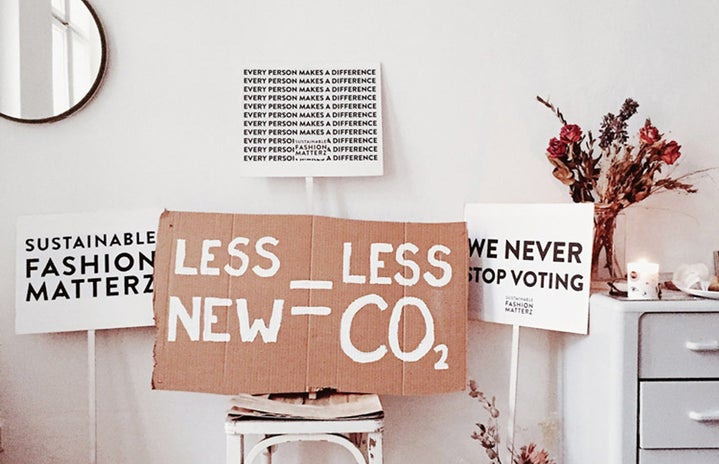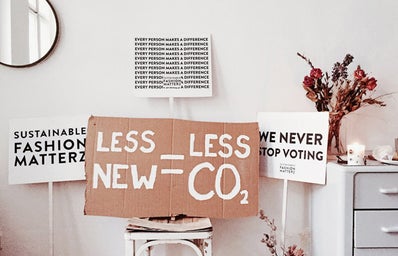It is no secret that the waste generated today has increased dramatically over the past decade. Our societies have become increasingly fast-paced, and advertising has changed the way we think about shopping. According to the Center of Ecotechnology, 95% of textiles have the potential to be reused or recycled, but only 15% are ever recycled! Let that sink in. The largest contributor to textile waste comes from fast fashion, a business model that produces massive quantities of clothing at low prices. Fast Fashion has ‘trends’ that come and go fairly quickly. Prior to its popularity, there were four seasons of clothing in a year, that number is now somewhere around ten seasons. When clothing is sold at significantly lower prices, consumers are less likely to hold onto them and more likely to discard them when the current ‘trend’ dies out. Low prices also mean the material used to make the clothing is detrimental to the environment and workers are paid low wages. Ethical shoppers are consumers whose shopping habits align with their personal beliefs. Ethical shoppers are aware of the impact they have on the environment and the inhumane working conditions for the people who make the clothes. It is worth mentioning that fast fashion is not only damaging to the earth and to the laborers who make them, but also the mindset of ‘more is better’ or trying to ‘catch up to the latest trends’ to fit in. Social media and advertisements convince us that we need specific things to be good enough for those around us, and in my experience, I have found myself chasing after the next thing to make me ‘good enough’, but it always leads to needing something else, and the cycle continues. It is important to look within and address the content we consume and how it plays into how we think. As cliché as it sounds; comparison is the thief of joy. Here are my personal tips on how to shop ethically.
- Unsubscribe From Those Newsletters
-
When you get frequent advertisements in your mailbox, it becomes more tempting to spend money on items you do not need, especially when those emails come with discount codes that will expire in the next hour if not used! Some emails will use phrases such as ‘Hurry up before its gone!’, ‘For a limited time only!’ or even go as far as use timers counting down the time you have to purchase deals. The best way to avoid this is to unsubscribe from these newsletters and advertisements.
- Shop Second Hand
-
I personally love thrift shopping! I enjoy the adventure of looking through clothes until I find a gem for a third of the price! There are so many used clothes in perfectly good condition for low prices! You save money and the environment this way. If you have to buy something new, think about where you’re shopping from and whether you will keep the item for a long time. Try buying clothes made from recycled materials!
- Sleep on It
-
A great way to prevent impulse shopping is to put items in your cart but not check out. Sleep on them or give yourself a few days to really think about whether you need the item. I have found that when I sleep on items, I tend to realize I didn’t really want the item and it was just an emotional response. I’ve saved so much money this way.
- Practice Gratitude
-
There is a significant amount of evidence from positive psychology that associates gratitude with greater life satisfaction and brain rewiring through neuroplasticity (your brain’s ability to change/break down/build new neuronal connections over time). Gratitude focuses your attention on what you do have, not what you don’t have. It is helpful to slow down and take in the things you have already that bring you joy.
- Donate to Textile Recycling Locations in Your Community
-
Remember, besides clothes, textiles are also used to make bag packs, bedding, towels, curtains, stuffed animals, belts, ties, gloves, purses, slippers, shoes, and undergarments. Many textile recycling organizations accept textiles that you may consider unwearable and recycle them to make other products as mentioned! Check within your community to see if textile recycling is available in your community and donate!
- Do Clothing Swaps
-
Clothing swaps are parties where you and other people bring clothes and accessories to trade and donate to each other. This is a great way to give your clothing to someone who may value them while also getting some clothing for yourself for no extra cost! You can host one yourself with a few friends, or look for any happening in your community.
- Avoid Clothing Made from Low Quality Material
-
When I used to shop fast fashion, I noticed how badly made the clothing was, especially the poor choice of material. Many of the clothing also had a sharp chemical-like smell which can have adverse health effects on humans. Green America stated that over 8,000 chemicals are used to generate textiles from raw materials, and 43 million tons of chemicals are used to dye and treat clothing.
The main trouble with ethical shopping is that not everyone can afford it because they tend to be on the pricier end. However, these clothes tend to last longer, and you value them a lot more because of the amount of money spent on them. There is so much more to life than chasing after the next trend. Making the world a better place to live in depends on our choices.


